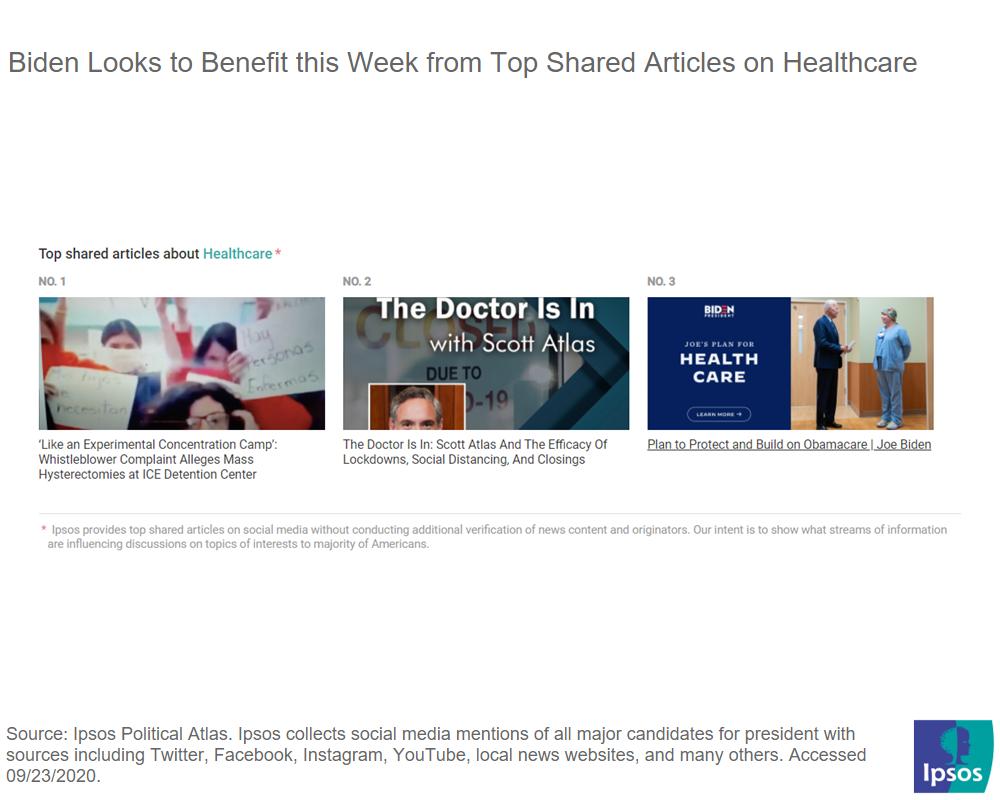Digital elections aren’t binary affairs
During a week filled with breaking news events, among them the passing of the iconic Supreme Court Justice Ruth Bader Ginsburg and the race to fill her seat on the bench, at first glance, looks promising for presidential contender Joe Biden. [i]
The top trending issues on social—coronavirus, the environment, and healthcare— present a trifecta of opportunity for the former vice president. These are the issues Biden performs best on in the polls. Only about one in three Americans believe President Trump performs better on COVID-19 than former Vice President Joe Biden would, and Biden is in the green by double-digits on healthcare.

The one issue the president decisively outplays Biden on, the economy, is being eclipsed by the conversation around healthcare, at least on social media. Top shared articles on this issue deal with the bombshell whistleblower report that ICE was conducting mass hysterectomies for women detained at detention centers on the southern border. Former Vice President Joe Biden’s campaign page on the Affordable Care Act is also among the top three shared links circulating on social [ii]

So, are the digital winds at Biden’s back?
Not entirely, it would seem. President Trump still wields his superpower: his ability to control the conversation. Over the past two days, he has made up about three-quarters of the total news headline share, and website traffic to his campaign site far outperforms Biden’s page. Given Trump’s ability to control the narrative and the fact that he is a sitting president, it is not wholly surprising he is dominant on this front. Reelection years are often referendums on the incumbent.
Though, the prowess of the Trump digital effort still shows up in other metrics. Trump currently makes up around 80% of total web traffic going to either candidate’s campaign websites. This remains true Even as Joe Biden outspends President Trump on Facebook ads by about three-to-one.


Importantly President Trump is still engaging in some standard forms of in-person campaigning, particularly large rallies, methods that the Biden campaign has practically sworn off due to the pandemic, opting for smaller, prepared in-person events.
The past few months changed life for Americans, growing the digital interaction campaigns have with voters in a way never before seen. These digital metrics speak to how tight the race is and how mixed dominance across all domains can be. Winning the day on these fronts might not mean winning the war, though it would certainly help.
[i] Ipsos collects social media mentions of all major candidates for president with sources including Twitter, Facebook, Instagram, YouTube, local news websites, and many others. Ipsos has developed AI-driven approaches for measuring candidate net social favorability, share of social voice and main issue tagging as well as bot detection. Additionally, Ipsos measures velocity associated with discussion of a specific candidate or issue, therefore providing immediate insight whether this conversation is becoming more relevant to potential voters.
[ii] Ipsos provides top shared articles on social media without conducting additional verification of news content and originators. Our intent is to show what streams of information are influencing discussions on topics of interests to majority of Americans.


